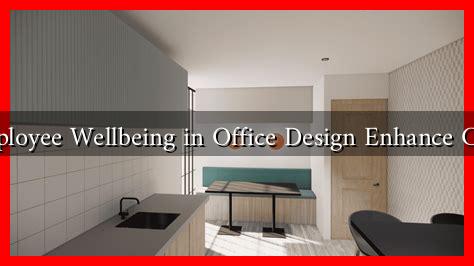-
Table of Contents
- Can Employee Wellbeing in Office Design Enhance Creativity?
- The Connection Between Wellbeing and Creativity
- Key Elements of Office Design that Promote Wellbeing
- Case Studies: Successful Office Designs
- Statistics Supporting the Impact of Office Design on Creativity
- Conclusion: The Future of Office Design
Can Employee Wellbeing in Office Design Enhance Creativity?
In today’s fast-paced business environment, organizations are increasingly recognizing the importance of employee wellbeing in fostering creativity and innovation. The design of office spaces plays a crucial role in shaping the work experience, influencing not only productivity but also the overall mental and emotional health of employees. This article explores how thoughtful office design can enhance employee wellbeing and, in turn, boost creativity.
The Connection Between Wellbeing and Creativity
Research has shown a strong correlation between employee wellbeing and creativity. When employees feel comfortable, supported, and engaged, they are more likely to think outside the box and contribute innovative ideas. According to a study by the University of Warwick, happy employees are 12% more productive than their unhappy counterparts. This statistic underscores the importance of creating an environment that prioritizes wellbeing.
Key Elements of Office Design that Promote Wellbeing
To enhance employee wellbeing through office design, several key elements should be considered:
- Natural Light: Access to natural light has been linked to improved mood and energy levels. A study published in the journal Environmental Health Perspectives found that employees with access to natural light reported 51% fewer eyestrain symptoms and 63% fewer headaches.
- Biophilic Design: Incorporating elements of nature, such as plants and natural materials, can reduce stress and enhance creativity. A study by the University of Queensland found that workplaces with plants saw a 15% increase in productivity.
- Flexible Workspaces: Providing a variety of workspaces—such as quiet zones, collaborative areas, and informal meeting spaces—allows employees to choose environments that best suit their tasks, fostering creativity and collaboration.
- Ergonomic Furniture: Comfortable and adjustable furniture can reduce physical strain and discomfort, allowing employees to focus on their work rather than their physical wellbeing.
- Color Psychology: The use of color in office design can influence mood and creativity. For example, blue hues are often associated with calmness and focus, while yellow can stimulate creativity and energy.
Case Studies: Successful Office Designs
Several companies have successfully implemented office designs that prioritize employee wellbeing and creativity:
- Google: Known for its innovative work environment, Google’s offices feature open spaces, recreational areas, and plenty of natural light. The company’s focus on employee wellbeing has been linked to its high levels of creativity and innovation.
- Airbnb: Airbnb’s headquarters in San Francisco incorporates biophilic design elements, including indoor gardens and natural materials. This design approach has been credited with fostering a collaborative and creative atmosphere among employees.
- Steelcase: The office furniture company Steelcase has designed its own workspace to reflect the principles of wellbeing and creativity. Their research indicates that employees in well-designed spaces are more engaged and productive.
Statistics Supporting the Impact of Office Design on Creativity
Several studies highlight the impact of office design on employee creativity:
- A report by the Gartner Group found that 75% of employees prefer a hybrid work model, indicating that flexibility in workspace design is crucial for wellbeing and creativity.
- The Harvard Business School reported that companies with well-designed workspaces experience a 20% increase in employee satisfaction and a 15% increase in creativity.
Conclusion: The Future of Office Design
As organizations continue to adapt to changing work environments, the importance of employee wellbeing in office design cannot be overstated. By prioritizing elements that enhance comfort, promote collaboration, and foster creativity, companies can create spaces that not only improve employee satisfaction but also drive innovation. The evidence is clear: investing in thoughtful office design is not just a trend; it is a strategic imperative for organizations aiming to thrive in a competitive landscape.
In summary, enhancing employee wellbeing through office design is a powerful way to unlock creativity. By focusing on natural light, biophilic elements, flexible workspaces, ergonomic furniture, and color psychology, organizations can create environments that inspire and motivate their employees. As we move forward, the integration of these principles will be essential in shaping the future of work.


